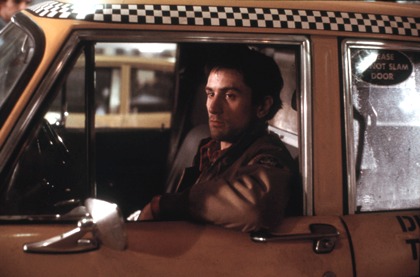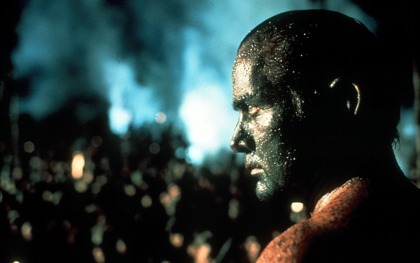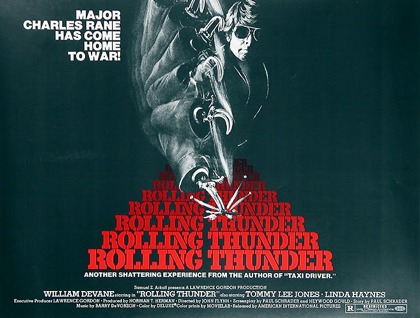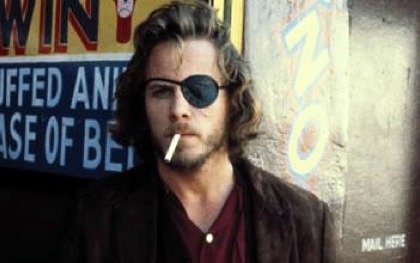Movie brat studies
How to tell a true war story

Taxi Driver (1976)
Nick Pinkerton on how Hollywood’s auteur generation distilled the Vietnam War into a new form of vigilantism
About a year after the last American was airlifted out of the Saigon embassy in April 1975, Francis Ford Coppola and retinue touched down in Manila. Starting preproduction on a much-revised John Milius script that had begun life as The Psychedelic Soldier, Coppola was going for a scoop, breaking a supposed conspiracy of silence in American movies with the first cinematic Vietnam since 1968’s jingoistic Green Berets.
Apocalypse Now, released finally in late summer 1979, came even later than Coppola feared. With Hal Ashby’s Coming Home and Michael Cimino’s The Deer Hunter, 1978 is often given as the watershed year for American movies about Vietnam – that’s only true, though, of the sort of movies that the Academy acknowledges. The war had already been reflected by the most quick-response and least esteemed of movies in the auteurist era, genre pictures: the reader is recommended to Richard Compton’s Welcome Home, Soldier Boys (1971) and Bob Clark’s Deathdream (aka Dead of Night / NightWalk, 1972), introducing the figure of the Vietnam vet returned stateside with a new appetite for action. Meanwhile, any hip moviegoer watching Martin Sheen’s Captain Willard pacing his hotel room, harried by his own diaristic voiceover (“Waiting for a mission – getting softer”), could have recalled another man adrift, looking for a self-defining quest.
Opening in early 1976, Taxi Driver is today touring the world in digitally restored 35th anniversary prints – the desaturated Daily News palette of the final gun battle, employed to avoid a commercially-damning ‘X’ rating, remains. The film’s protagonist, Travis Bickle, wore a military Tank jacket with a ‘King Kong Brigade’ patch, kept a burnt Viet Cong flag on the clothesline in his apartment, and had a ragged scar on his shoulder blade. Bickle claims to have been honourably discharged from the Marines, though given what we learn elsewhere of his fanciful inner life, we must take this on faith.

Apocalypse Now (1979)
A surprise hit at the time, Taxi Driver seems retrospectively inevitable – like a riot. It showcased Robert De Niro hot off a Best Actor Academy Award, and the film’s heavy freight of zeitgeist was delivered by Paul Schrader, a film critic-cum-screenwriter who, though cultivating a mystique of inspiration through self-destruction, was canny and ambitious, and had closely studied the correlation between genre myths and popular taste.
In 1974 Schrader, whose script (with brother Leonard) for the The Yakuza had recently sold for a record sum, wrote a primer for Film Comment on Japanese yakuza movies, which he had soaked up at Los Angeles’s Toho theater. He concluded with generalised comments about genre, specifically the climate conditions that act to create new ones: “When massive social forces are in flux, rigid genre forms often arise to help individuals make the transition… When a new genre comes into being, one immediately suspects that its causes run far deeper than the imagination of a few astute artists and businessmen. The whole social fabric of a culture has been torn, and a new metaphor has arisen to help mend it.”
Struggling to protect the integrity of Schrader’s feral script from studio grooming, Scorsese argued that if he couldn’t make Taxi Driver the right way, he “might as well have made another genre film for Roger Corman”. In fact, Scorsese was fighting to make one for himself. The new form which Taxi Driver addressed, while disturbing it with the frank pathology of its protagonist, was the vigilante narrative, the tenets of which were worked out through the early 70s in the exploits of Charlie Bronson, Harry Callahan and ex-Marine turned-vigilante Frank ‘The Punisher’ Castle, introduced in Spider-Man #129 as a villain before starting into his own anti-hero story arcs. The western’s concern with Rule of Law vs. Self-Determination was updated to a contemporary urban America, addressing a widespread feeling that the criminal justice system specifically, and systems generally, no longer functioned. (The references to the western in Taxi Driver are well-documented, from the Indian headgear of Harvey Keitel’s pimp to Bickle’s cowboy boots, a short man’s prop.)

Also scripted by Schrader, Taxi Driver’s Southwest-set twin brother, Rolling Thunder, reached drive-ins in 1977. Revised by Heywood Gould and directed by no-frills genre utility man John Flynn, the final product has been effectively disowned by Schrader, who dismisses it as a “fascist film” – though those are the words of the arrived artist, with reason to deny downmarket ties. Schrader has preferred to discuss Taxi Driver’s other influences, the Diaries of a Country Priest, an Underground Man… and Arthur Bremer, the assassin who shot George Wallace, an incident echoed when Bickle haunts the public speaking engagements of presidential hopeful Senator Palantine.
Marrying grindhouse seediness to auteur virtuosity, Schrader and Scorsese introduced a cinematic sick-soul sordidness previously ghettoised to Times Square fleapits to a wider public – literally taking the viewer inside some of those fleapits, like the long-defunct Lyric Theater on 42nd St. A nerve was struck: “Are you talkin’ to me?” Bickle famously asked and, for many, Taxi Driver was.
Marlon Brando’s Col. Walter E. Kurtz, the endboss of Apocalypse Now, was another sort of vigilante, an elephantine rogue broken off from the chain of command. After a long, agonised, much-documented labour, Coppola erupted with his flotsam of scenes, a sensory-overload darkride through American foreign-policy showmanship in action. (The latest re-release returns to the original theatrical cut – maybe it should’ve been transferred to 3D.)
Apocalypse Now’s DeMillian vision of the purple haze of war remains without peer – while the grand finale of this 4th of July remains a sad, bedraggled fizzle, perhaps an appropriate with-a-whimper note for the self-mythologising, failure-obsessed anti-Hollywoodian cinema, its reflexivity compounded by the counterculture-iconic casting of wrecked Brando and Dennis Hopper. Coppola might have solved his agonies over the last reel by following Joseph Conrad’s example, returning his narrator to civilisation; perhaps he considered that Scorsese had already made that ending.

Cutter’s Way (1981)
Apocalypse Now returned its investment, though would later be pointed to as continuing the one-upping brinksmanship of auteur mega-productions that ruined New Hollywood’s credit line. When Cutter’s Way (aka Cutter and Bone), a character-driven mystery story, opened in March 1981, much of the United Artists front office, including Cutter’s Way’s onetime supporters, had gone overboard with the foundered Heaven’s Gate. Directed by the Czech expat Jan Passer, starring Jeff Bridges, and based on a 1976 novel by Newton Thornburg, Cutter’s Way, in cosy with all-American losers, was already a throwback to a decade past – in much the way that Bridges, whose easy delivery determines the pulse of any scene he’s in, is a meandering, quintessentially 70s-style actor. It opened nowhere, then disappeared.
John Heard plays a Vietnam veteran named Cutter, stripped of his left-side appendages from his prosthetic leg up to his eyepatch; Bridges is a gigolo boat salesman working the Santa Barbara marina. The plot, in which a leading citizen is suspected accountable in an enormously vile crime, echoes Chinatown. As in Taxi Driver, Cutter’s has a Vietnam vet smuggling a hand-cannon into a public function, here intending to bring an above-the-law authority figure to justice. Senator Palantine survived Taxi Driver; Cutter’s cuts out on gunfire.
Ten days after Passer’s film was unceremoniously dumped, John Hinckley, Jr. managed to ricochet a bullet into Ronald Reagan, wounding the President as he left the Washington Hilton. Hinckley, Jr. had never been to Saigon, but he had seen Taxi Driver 15 times, and had the unlikely notion of impressing the film’s star, Jodie Foster, with his marksmanship. It was some time yet before another disturbed Vietnam vet, John Rambo, would appear, then to be regenerated to the presidential bodyguard, mending rent social fabric, but the Hinckley episode will serve nicely as the open ending of the open-ending era.
The 35th anniversary digital restoration of ‘Taxi Driver’ is re-released on 13 May, the digital restoration of ‘Apocalypse Now’ on 27 May, and ‘Cutter’s Way’ on 24 June 2011, at venues around the UK. ‘Rolling Thunder’ will be released on DVD/Blu-ray (Optimum) on 19 September
Correction (25 May 2011): The re-release date of Cutter’s Way has been postponed until 24 June. This has been amended above.
See also
Arthur Penn: cerebral subversive: Peter Biskind pays tribute to the New Hollywood director (December 2010)
Dennis Hopper: the last director: Brad Stevens on the late actor-director’s The Last Movie (June 2010)
The Killing of John Lennon reviewed by Mark Fisher (January 2008)
Giant steps: David Thomson on Hollywood’s 1970s mavericks (September 2006)
Modern times: a Sight & Sound poll of the best films of the late twentieth century, topped by Apocalypse Now (December 2002)
Casualties of war: Philip Horne on Coppola’s Apocalypse Now Redux (November 2001)
Death’s cabbie: David Thomson on Scorsese and Schrader’s reteaming on Bringing Out the Dead (December 1999)
